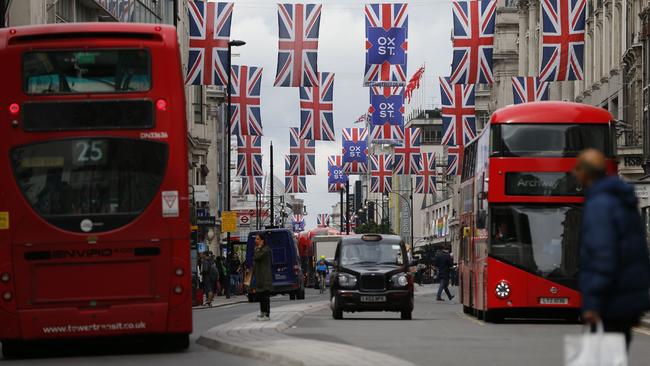Rush to safety despite Mark Carney’s Bank of England stimulus
International markets are roiling almost a fortnight after Britain’s shock decision to exit the European Union.

International markets are continuing to roil almost a fortnight after Britain’s shock decision to exit the European Union, as financial stocks and the oil price plunged in the wake of an ugly warning stumped up by Bank of England governor Mark Carney.
The pound tumbled to a fresh 31-year low as Mr Carney flagged a “material slowing” of the British economy as his central bank went on the front foot with a £150 billion ($260bn) stimulus by slashing capital requirements for banks in a bid to lift lending.
Bond markets bore the brunt of the rush to havens, with the US 10-year and German 10-year bond yields plumbing new lows. Yesterday the Australian 10-year commonwealth government bond yield slid to a fresh record low of 1.841 per cent despite continued jitters that Australia’s AAA rating is at imminent risk of a downgrade following an unclear federal election result.
Elsewhere, the yield on Japan’s 20-year government bond fell below zero for the first time ever and the 10-year Japanese government bond yield also fell, hitting a record low of -0.275 per cent.
After shrugging off the fallout from Saturday’s still-undecided election, the Australian dollar was caught up in a fresh bout of global jitters, sliding almost 1 per cent. Global oil prices also slumped amid the turmoil, retreating nearly 5 per cent.
Gold gained another 0.4 per cent early yesterday as investors picked up the safe yellow metal once again.
The vulnerable state of the European markets is attracting short-sellers in droves. Figures from information company Markit show the average short interest in European banks has doubled over the year to date to 2.6 per cent, with bearish investors adding almost $US1bn to short interest holdings in British banks since the Brexit vote.
The shockwaves of European jitters were felt on the Australian sharemarket, as stocks with British exposure and bank stocks were hit hard in yesterday’s trade.
Dual-listed NAB spin-off Clydesdale Bank, which is the second most shorted European bank with 7.2 per cent of its shares held short — an increase of 64 per cent since Brexit — slumped 4.6 per cent during trade yesterday.
Henderson Group lost 3.8 per cent to $3.50 and BT Investment Group dropped 2.5 per cent to $7.28. The global markets-exposed Macquarie Group gave up 1.4 per cent to $66.75 and QBE fell 1.8 per cent to $10.11.
The S&P/ASX 200 benchmark closed 0.6 per cent lower at 5197.5 points, despite having fallen as much as 1.3 per cent during intraday trade, as the big four banks slumped, led by ANZ, which fell 1.9 per cent. Japanese shares ended down 1.85 per cent while European markets opened lower last night.
Debt market specialist Phil Bayley, of ADCM, said there was a cause for concern in the local banks.
“Obviously Australian banks are in a much stronger position than any of the European banks, but when these sorts of concerns emerge in the market investors don’t always discriminate,” Mr Bayley told The Australian.
“Australia is very reliant on international funding and the banks are going to suffer higher funding costs as a result of the volatility we’re seeing and the risk-off aversion in the market.”
Adding to the global financial market malaise, analysts are questioning whether an expected Reserve Bank of Australia interest rate cut next month will further damage the sector’s profitability, which is under threat of rising lending losses and the need to raise even more capital.
Altair Asset Management analyst Tristan K’Nell said the possibility of a royal commission into banks was “still up in the air” following the election, and had investors rotating out of the lenders.
Bell Potter Securities’ Richard Coppleson said the election was “a gift to the hedge funds wanting to short Australian banks” given the number of “rogue independents” who had called for a royal commission set to enter parliament.
“There is a very good chance on current projected numbers and comments made that this could well happen,” Mr Coppleson said.
Since the Brexit vote, short interest in Commonwealth Bank of Australia has hit its highest point since early March, but for the other three major banks short interest is near its lowest since January. Still, punters are betting against further falls in Henderson Group and BT Investment.
Mr Coppleson said the banks would feel the pain of a potential AAA-credit rating downgrade, which ratings agency Fitch said was a one-in-two chance, with higher funding costs likely to drive up interest rates and put upward pressure on bad debts.
“This won’t happen in the short term — but the (hedge funds) play the long game in these and this is an easy trade for them. Political uncertainty overhanging the bank sector — why would anyone buy them with that now a big chance of coming,” he said.
“Watch the shorts go up even more as the week progresses.”



To join the conversation, please log in. Don't have an account? Register
Join the conversation, you are commenting as Logout